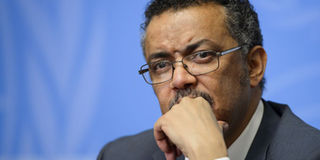China must cooperate better with Covid origin probe, says WHO

Head of the World Health Organization, Tedros Adhanom Ghebreyesus. PHOTO/FILE/COURTESY
What you need to know:
- Tedros Adhanom Ghebreyesus told reporters in Geneva that the UN health agency had developed a framework for moving forward with the second phase of the vital investigation into where Covid-19 came from.
The WHO chief called Thursday for China to cooperate better in the next phase of investigations into the origins of the pandemic, demanding more access to raw data.
Tedros Adhanom Ghebreyesus told reporters in Geneva that the UN health agency had developed a framework for moving forward with the second phase of the vital investigation into where Covid-19 came from.
"We hope there will be better cooperation to get to the bottom of what happened," he said.
He pointed to several problems during the initial probe.
"One problem is sharing raw data and I said it at the conclusion of the first phase, that there is this problem and it has to be addressed," he said.
Another issue he acknowledged was that "there was a premature push to ... especially reduce one of the options like the lab theory."
The UN health agency has been facing intensifying pressure for a new, more in-depth investigation of Covid-19's origins.
The WHO only managed to send a team of independent, international experts to Wuhan in January, more than a year after Covid-19 first surfaced there in late 2019, to help probe the pandemic origins.
But in their long-delayed report published in late March, the international team and their Chinese counterparts drew no firm conclusions, instead ranking a number of hypotheses according to how likely they believed they were.
The report said the virus jumping from bats to humans via an intermediate animal was the most probable scenario, while a theory involving the virus leaking from a laboratory was "extremely unlikely".
The investigation and report have faced criticism for lacking transparency and access, and for not evaluating the lab-leak theory more deeply -- a mere 440 words of the report were dedicated to discussing and dismissing it.
Long dismissed as a right-wing conspiracy theory, and vehemently rejected by Beijing, the idea that Covid-19 may have emerged from a lab leak has been gaining increasing momentum in the United States especially.
Tedros, who has continued to insist that all theories remain on the table, insisted Thursday that more investigation was needed.
"I was a lab technician myself, an immunologist, and have worked in the lab, and lab accidents happen," he said.
"It's common. I have seen it happening," he said, stressing that "checking what happened, especially in our labs, is important."
"We need information, direct information on what the situation of these labs was before, at the start of the pandemic."
Tedros had previously lamented that the international team did not have access to all the raw data needed to make a proper assessment.
For the next phase of the investigation, he said, "I hope there will be better cooperation, and we have continued the engagement with China, and also with (other) member states, ... to get into the bottom of what happened."
Pointing to the more than four million official deaths from Covid worldwide, the WHO chief said: "I think we owe it to them to know what happened."





